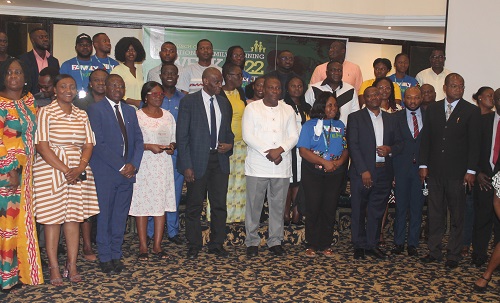
The low use of contraception and other family planning (FP) methods among the Ghanaian public is highly associated to the spread of HIV/AIDs in the country, Programme Manager of the National STIs and HIV/AIDs Control Programme (NACP), Dr. Stephen Ayisi-Addo has said.
“Our data shows that anytime there is a shortage of condoms in the country, sexually transmitted infections (STIs) cases increases and the prevalence of HIV among STI cases is 12 percent compared to the general population of 1.7 percent.
Pregnant women who have unprotected sex have HIV prevalence of two percent so, the value of condoms as an important FP tool and other contraceptive methods cannot be underestimated if we are to achieve progress and national development.”
DrAyisi-Addo was speaking at the commemoration of World Contraception Day yesterday and the launch of this year’s National Family Planning Week on the theme; “Breaking Myths and Misconceptions on Family Planning.”
The celebration seeks to increase public awareness and acceptance of FP while dispelling myths and misconceptions and advocating increased commitment to FP interventions as an essential tool for national health and socio-economic development.
As part of the celebration, a new television series; “ATOUA” which means, “should it happen to you,” was also launched to educate the youth on their reproductive health, highlighting the risks of unhealthy sexual behaviours and its possible effect on their aspirations in life.
The Programme Manager cautioned the youth against replacing the use of condoms with contraceptive or emergency pills saying; “without using a condom you can prevent pregnancy but not HIV so at every point in time when you are using a contraceptive it is good to use the barrier method as well.”
“We advised that people use contraceptives correctly, consistently and continuously and you will be free from HIV and free from unwanted pregnancies to make informed choices on your sexual rights for better survival and development,” he urged.
The Director, Family Health Division at the Ghana Health Service (GHS), Dr Kofi Issah, said despite the almost universal knowledge in family planning in the country, the use of contraception remains low at 25 percent among married women and 62 percent for adolescents (10 to 19 years) who are sexually active.
He said despite a decline in fertility rate in the country from 4.4 in 2010 to 3.6 in 2021, there remained a large unmet need for contraception, increasing the rate of unintended pregnancies, unsafe abortions and maternal mortalities.
“Fear of side effects, rumours, myths and misconceptions are the most frequently cited reasons for non-use of modern FP methods. Poor attitude of health workers and provider bias are also deterrents to utilization and we have to make efforts to address this.”
Dr. Issah said, there was a 35 percent FP acceptance nationwide which vary from region to region but the youth were largely not covered hence the Service was targeting them to support them with the right tools and services to navigate their puberty and young adulthood stages in view of their sexual needs.
He called on all “of us working in communities, to join us on this campaign, by using each episode of the ATUOA series to hold meaningful discussions with young people in our homes, schools, churches and peer groups; so that collectively we can empower our youth and reduce the high unmet need for contraception amongst our youth.”
The Acting Country Director of Marie Stopes Ghana, Mr George Akanlu in a speech read on his behalf, said Ghana needed strategic efforts to address myths and misconceptions surrounding FP methods and contraceptives especially among the youth.
“About 11 percent of all unsafe abortions in Ghana end in maternal mortality and we need to empower people particularly our youth to make informed decision on their sexual health rights.”
BY ABIGAIL ANNOH






